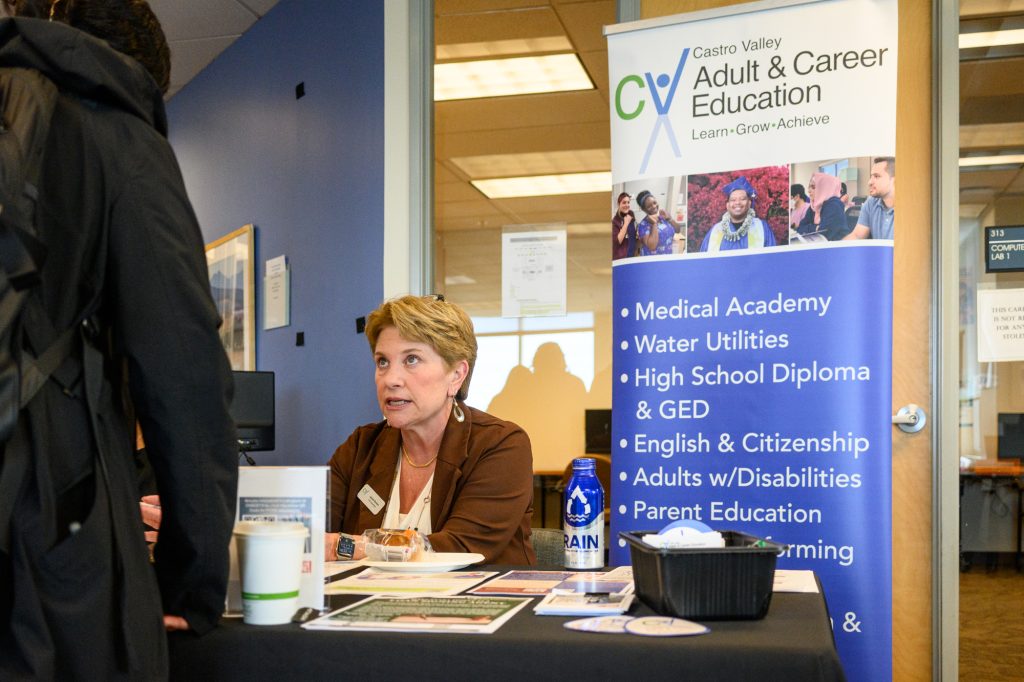Adult education consortium and job center share resources and connections to improve employment opportunities for adult students

A community can only benefit from education and opportunity, and providing these to Mid-Alameda County is one of the driving forces behind the partnership between the Mid-Alameda County Consortium (MACC) and the Eden Area office of the American Job Center of California (AJCC).
MACC, an adult education consortium, and the job center have worked together since the former’s establishment in 2016, and the collaboration is an extension of the consortium’s partnership with the Alameda County Workforce Development Board.
“We are mandated partners with the Workforce Development Board for Alameda County to coordinate and streamline adult education and workforce development services. This partnership is a requirement of the federal Workforce Innovation and Opportunity Act [WIOA] and is reinforced by state legislation,” Tim Combs, MACC’s director, says. “So we work together in a variety of different ways.”
The AJCC is itself operated by Rubicon Programs, an East Bay-based nonprofit focused on economic enrichment. The two groups meet quarterly to discuss partnership goals, and have a Seamless Transitions work group which meets monthly to look at ways to better help adult students on their career pathways.
“In some cases, we’re trying to get students to transfer from our adult school into the community college or from one adult school to a different adult school that offers a different program. Ultimately, regardless of where they access their training, we want to help everybody move into the workforce.”
Tim Combs, Director, Mid-Alameda County Consortium

“In some cases, we’re trying to get students to transfer from our adult schools into the community colleges, or from one adult school to another that offers a different program,” Combs says. “Ultimately, regardless of where they access their training, we want to help everybody move into the workforce.”
Combs says MACC and the AJCC work together via cross-referrals and resource sharing, which allows MACC to better streamline the job finding experience for students.
“They [The AJCC], in turn, refer people to us that walk into their doors looking for job search assistance,” Combs says. “Sometimes training is necessary for someone to either get a skills upgrade or to change the focus of their career, so obviously the adult schools and the community colleges are a go-to.”
Nina Scott, the site manager for the Eden Area AJCC, points to the WIOA program as a good example of this cross-referral system in action. A federal program, the WIOA provides job seekers with a coach who will help them create a road map for their career goals, including training and funding options.
“We can put together a request with that individual for our board to pay for career technical education training,” Scott says. “MACC, a membership collective of the adult schools and colleges, has programs we can cross-refer individuals to and the WIOA program can sponsor it.”
The two organizations have also made strides in communicating the benefits of their partnership and the opportunities it provides to the community. To this end MACC and the AJCC hold a variety of job fairs and information sessions. These events help let people know about different resources and provide them with connections to the various employers throughout the region.
“The schools do a lot of different types of events … it could be promoting an information session for one of the programs or a school could be holding a hiring event,” Combs says. “The AJCC will set up a resource fair and they’ll come over and bring other partners, like the food banks and childcare assistance, and then they’ll promote the WIOA program as well.”
The MACC recently created a new three-year plan to identify and accomplish their goals for the near future; Combs says he’s optimistic because of the strength of the partnership with the AJCC.
“I think we’re headed in the right direction and making a lot more progress every year,” Combs says. “It’s a good time for us to really lean into each other for partnership right now and make sure that we’re leveraging all the resources that we can, that we’re working together and making this robust training and employment system for the community.”
The Mid-Alameda County Consortium (MACC) is one of 71 consortia of adult education providers across the state. The MACC includes Chabot College, Las Positas College, Eden ROP, Tri Valley ROP, and the adult schools in Castro Valley, Dublin, Hayward, Livermore, New Haven, Pleasanton, San Leandro, and San Lorenzo. For more information about the MACC and its member schools, go to www.macc4ae.org. To learn more about The Eden Area AJCC and Rubicon Programs, visit edenareaonestop.org and rubiconprograms.org, respectively.
Written by Jacob Peterson
| Regions | Classes & Topics |
|---|---|
| Bay Area California | Variety of Classes – Workforce Development Board |